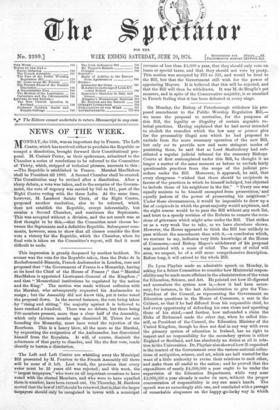This impression is greatly deepened by another incident. No sooner
was the vote for the Republic taken, than the Duke de la Rochefoucauld-Bisaccia, French Ambassador in London, rose and proposed that "the Government of France is a Monarchy, having at its head the Chief of the House of France ;" that "Marshal AlacMahon is appointed Lieutenant-General of the Kingdom ;" and that "Monarchical institutions be regulated by the nation and the King." The motion was made without collusion with -the Marshal, who subsequently requested his Ambassador to resign ; but the Assembly did not know this, yet it twice voted the proposal down. In the second instance, the vote being taken by "rising and sitting," the majority against it is believed to have reached a hundred. There was no debate, but there being 700 members present, more than a clear half of the Assembly, Which only thirteen months ago dismissed M. Thiers for not founding the Monarchy, must have voted the rejection of the Bourbons. This is a heavy blow, all the more as the Marshal, by requesting the resignation of the Ambassador, has dissociated himself from the Royalists. It will, of course, diminish the reluctance of that party to dissolve, and like the first vote, tends directly to hasten a dissolution.


































